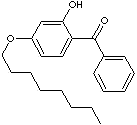PRODUCT IDENTIFICATION
1843-05-6; 103843-15-8; 53571-69-0; 58392-23-7;

2-Hydroxy-4-n-octoxybenzophenone; Benzophenone-12;
CLASSIFICATION
PHYSICAL AND CHEMICAL PROPERTIES
SOLVENT SOLUBILITY
Negligible
REFRACTIVE INDEX
APPLICATIONS
Chemical ingredients for sunscreen are;
- p-Aminobenzoic acids
- p-Aminobenzoic acid (CAS #: 150-13-0)
- p-Aminobenzoic Acid, monoglyceryl Ester (CAS #: 136-44-7)
- p-Aminobenzoic Acid, octyl dimethyl Ester (Padimate 0, CAS #: 21245-02-3)
- p-Aminobenzoic Acid, ethyl dihydroxypropyl (Roxadimate, CAS #: 58882-17-0)
- p-Aminobenzoic Acid, 2,4-dihydroxy-N-(3-hydroxypropyl)-3,3-dimethylbutanamide ester
- Octyl Triazone (CAS #: 88122-99-0)
- p-Aminobenzoic Acid, PEG-25 (CAS #: 116242-27-4)
- Anthranilates
- Menthyl anthranilate (CAS #: 134-09-8)
- Benzophenones
- Benzophenone (CAS #: 119-61-9)
- 2,4-Dihydroxybenzophenone (Benzophenone-1, CAS #: 131-56-6)
- 2,2',4,4'-Tetrahydroxybenzophenone (Benzophenone-2, CAS #: 131-55-5)
- 2-Hydroxy-4-methoxybenzophenone (Benzophenone-3, Oxybenzone, CAS #: 131-57-7)
- 2-Hydroxy-4-methoxybenzophenone-5-sulfonic Acid (Benzophenone-4, Sulisobenzone, CAS #: 4065-45-6
- 2-Hydroxy-4-methoxybenzophenone-5-sulfonic Acid, Monosodium Salt (Benzophenone-5, CAS #: 6628-37-1)
- 2,2'-Dihydroxy-4,4'-dimethoxybenzophenone (Benzophenone-6, CAS #: 131-54-4)
- 5-Chloro-2-hydroxybenzophenone (Benzophenone-7, CAS #: 85-19-8)
- 2,2'-Dihydroxy-4-methoxybenzophenone (Benzophenone-8, Dioxybenzone, CAS #: 131-53-3)
- 2,2'-Dihydroxy-4,4'-dimethoxybenzophenone-5,5'-disulfonic Acid Sodium Salt (Benzophenone-9, CAS #: 76656-36-5)
- 2-Hydroxy-4-methoxy-4'-methyl-benzophenone (Benzophenone-10, Mexenone, CAS #: 1641-17-4)
- Bis(2,4-ihydroxyphenyl)Methanone (Benzophenone-11, CAS #: 1341-54-4)
- 2-Hydroxy-4-(Octyloxy)Benzophenone (Benzophenone-12, Octabenzone, CAS #: 1843-05-6)
- 2,2'-Dihydroxy-4-methoxybenzophenone (Dioxybenzone, CAS #: 131-53-3)
- 2-Hydroxy-4-methoxybenzophenone (Oxybenzone, CAS #: 131-57-7)
- 2-Hydroxy-4-methoxybenzophenone-5-sulphonic Acid (Sulisobenzone, CAS #: 4065-45-6)
- Camphors
- Benzylidene Camphor Sulfonic Acid (CAS #: 56039-58-8)
- 3-Benzylidene Camphor (CAS #: 15087-24-8)
- Polyacrylamidomethyl Benzylidene Camphor (CAS #: 113783-61-2)
- Terephthalylidene Dicamphor Sulfonic Acid (CAS #: 90457-82-2)
- 3-(4-Methylbenzyliden)Camphor (CAS #: 36861-47-9)
- Camphor Benzalkonium Methosulfate (CAS #: 52793-97-2)
- Bornelone (CAS #: 2226-11-1)
- Cinnamates
- Ethyl Cinnamate (CAS #: 103-36-6)
- 2-Ethoxyethyl-p-methoxycinnamate (Cinoxate, CAS #: 104-28-9)
- Isoamyl P-methoxycinnamate (CAS #: 71617-10-2)
- Diisopropyl Methyl Cinnamate (CAS #: 32580-71-5)
- 2-Ethylhexyl Alpha-cyano-beta-phenylcinnamate (Octocrylene, CAS #: 6197-30-4)
- Diethanolamine Methoxycinnamate (CAS #: 56265-46-4)
- Isopropyl Methoxycinnamate (CAS #: 5466-76-2)
- Isoamyl P-methoxycinnamate (CAS #: 71617-10-2)
- Glyceryl Octanoate Dimethoxycinnamate
- Ethyl Diisopropylcinnamate (CAS #: 32580-72-6)
- Ethyl Methoxycinnamate (CAS #: 99880-64-5)
- Octyl Methoxycinnamate (CAS #: 5466-77-3)
- Dibenzoylmethanes
- Dibenzoylmethane (CAS #: 120-46-7)
- Isopropyl Dibenzoylmethane (Eusolex, CAS #: 63250-25-9)
- 4-tert-Butyl-4'-methoxy-dibenzoylmethane (Avobenzone, CAS #: 70356-09-1)
- Salicylates
- 3,3,5-Trimethylcyclohexyl Salicylate (Homosalate, CAS #: 118-56-9)
- Benzyl Salicylate (CAS #: 118-58-1)
- Octyl Salicylate (CAS #: 118-60-5)
- 2-Hydroxyethyl Salicylate (CAS #: 87-28-5)
- Menthyl Salicylate (CAS #: 89-46-3)
- Isopropylbenzyl Salicylate (CAS #: 94134-93-7)
- Imidazoles
- Phenylbenzimidazole
- Phenylbenzimidazol-5-sulfonic Acid (CAS #: 27503-81-7)
- Phenylbenzimidazole Tea Sulfonate (CAS #: 73705-00-7)
- Urocanic Acid (4-Imidazoleacrylic Acid, CAS #: 104-98-3)
- Ethyl Urocanate (CAS #: 27538-35-8)
- Bisymidazylate (CAS #: 180898-37-7)
- Sodium Phenylbenzimidazole Sulfonate (CAS #: 5997-53-5)
- Others
- Petrolatum Jelly (CAS #: 8009-03-8)
- Ethyl 2-cyano-3,3-diphenylacrylate (Etocrilene, CAS #: 5232-99-5)
- Diurethane Dimethacrylate (CAS #: 103597-45-1)
- Drometrizole Trisiloxane (CAS #: 155633-54-8)
- Bis(Ethylhexyloxyphenol Methoxyphenol) Triazine (CAS #: 187393-00-6
- 2-(2-Hydroxy-5-methyl-phenyl)Benzotriazole (Drometrizole, CAS #: 2440-22-4)
- Dioctyl Butamido Triazone (CAS #: 154702-15-5)
- Inorganic compounds (physical sunscreens)
- Titanium dioxide
- Zinc oxide
APPEARANCE
Yellow flake
SET POINT
Not regulated
|
Number |
Chemical name |
CAS RN |
|
Benzophenone-1 |
2,4-Dihydroxybenzophenone |
131-56-6 |
|
Benzophenone-2 |
2,2',4,4'-Tetrahydroxybenzophenone |
131-55-5 |
|
Benzophenone-3 |
Oxybenzone |
131-57-7 |
|
Benzophenone-4 |
Sulisobenzone |
4065-45-6 |
|
Benzophenone-5 |
2-Hydroxy-4-methoxybenzophenone-5-sodium sulfonate |
6628-37-1 |
|
Benzophenone-6 |
2,2'-Dihydroxy-4,4'-dimethoxybenzophenone |
131-54-4 |
|
Benzophenone-7 |
Chlorohydroxy benzophenone |
85-19-8 |
|
Benzophenone-8 |
Dioxybenzone |
131-53-3 |
|
Benzophenone-9 |
Disodium 2,2'-dihydroxy-4,4'-dimethoxy-5,5'-disulfobenzophenone |
3121-60-6 |
|
Benzophenone-10 |
Mexenone |
1641-17-4 |
|
Benzophenone-11 |
Bis(2,4-dihydroxyphenyl)methanone |
1341-54-4 |
|
Benzophenone-12 |
Octabenzone |
1843-05-6 |
PRICES